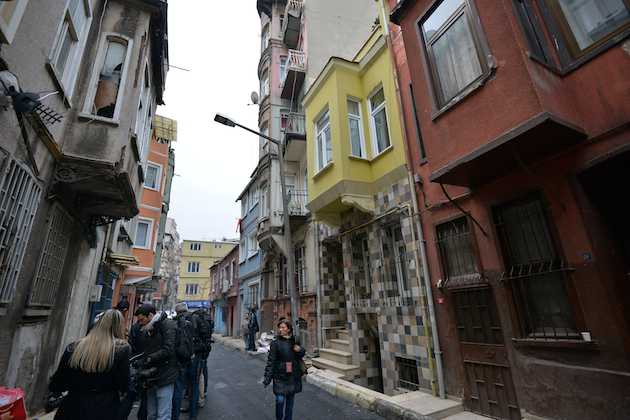New Yorker Sarai Sierra, 33, made sure to text, email or Skype with at least one member of her family every day of her three-week vacation in Istanbul.
But when Sierra’s father went to pick her up at Newark Liberty International Airport last Tuesday, he was told that she never boarded the plane. The mother of two young boys has now been missing in Istanbul for over a week.
Sierra visited Istanbul as a student of photography. She wanted to capture the city’s ancient landscapes, historic mosques and unique fusion of European and Asian influences — attractions that draw millions of tourists every year (6.9 million visited in 2010, according to U.S. News).
“Istanbul is fascinating because it’s a bridge between the East and the West, between traditional and modern ways of life,” said Paulina Muratore, 21, a senior at Boston University who studied abroad in Istanbul last semester.
Muratore calls Sierra’s disappearance “an extreme anomaly.”

A view of the street with the hostel, in yellow, where Sarai Sierra, a 33-year-old New York City woman was staying in Istanbul Monday, Jan. 28, 2013.
Boston native Muratore is one of a handful of Boston University students — typically three or four per semester — who study abroad at Boğaziçi University in Beşiktaş, Istanbul. For Muratore, an international relations major focusing on Middle Eastern studies, a semester in Istanbul was a lifelong dream fulfilled.
With a growing population now over 13.5 million, Istanbul is the third largest city in Europe, following London and Paris.
During the Arab Spring uprising, protesters looked to Istanbul as a model of a successfully modern, moderate Muslim community.
The megacity has undergone rapid urbanization, remaking many of its previously rundown neighborhoods, and fosters a thriving economy and a growing middle class.
Istanbul is also heralded as one of the safest metropolises in the world, with uncommonly low crime rates for such a densely populated city. While the U.S. State Department advises caution because of instances of “violent attacks” and a “continuing threat of terrorist actions,” it also notes that “the rate of street crime remains relatively low.”
“The city surpassed my expectations in terms of safety,” said Muratore, who said she only ever felt unsafe if she was out alone at night.
“People are very honest. For example, in Boston, people sneak onto buses through the back door to get away with not paying. But in Istanbul, if you get on the bus through the second door, everyone immediately rushes to pay their fare. I felt safer in Istanbul than I normally do here.”
The Turkish government does not conduct a national crime survey. The Istanbul Police Department reported 150,000 crimes in 2008, but it remains unclear where the number came from and what the department’s definition of “crime” entails.
The International Crime Victims Survey (ICVS), a worldwide poll of homeowners’ experiences with crime, presents a different — and compelling — perspective.
Thirty percent of Istanbul citizens surveyed said that they were victims of burglary over the past five years — a percentage higher than all other cities surveyed, including London, Paris and Amsterdam. Yet Istanbul had the lowest assault rate of all cities surveyed: Only 3.5% of residents said they had experienced assault over a five-year period.
The ICVS also found that attempted burglary and assault cases both had reporting rates of less than 20%. Additionally, crime statistics typically exclude the millions of squatters said to be living off the map in Istanbul.
However, widespread police reform is bringing about notable changes.
The Turkish police force is placing higher value on training and education. As of 2010 data from the the National Police Department, reported by Turkish newspaper Today’s Zaman, 85% of police now have undergraduate degrees.
The government has also set up a surveillance system that connects hundreds of cameras across Istanbul to police stations. Eighty-five percent of police stations are also monitored by security cameras, which has substantially cut down on allegations of torture and mistreatment by police.
The Turkish public is also highly involved in crime detection. Tens of thousands of public meetings have been held throughout Turkey, where millions gather to hear about criminal activity in their neighborhoods.
“There’s a great sense of community in Istanbul, which is really incredible for a city with such a large population,” Muratore said. “It’s surprising to an outsider, because in big U.S. cities, there’s more of a sense of the individual. In Istanbul, it never seemed like that. It’s just one big community.”

Leave a Reply